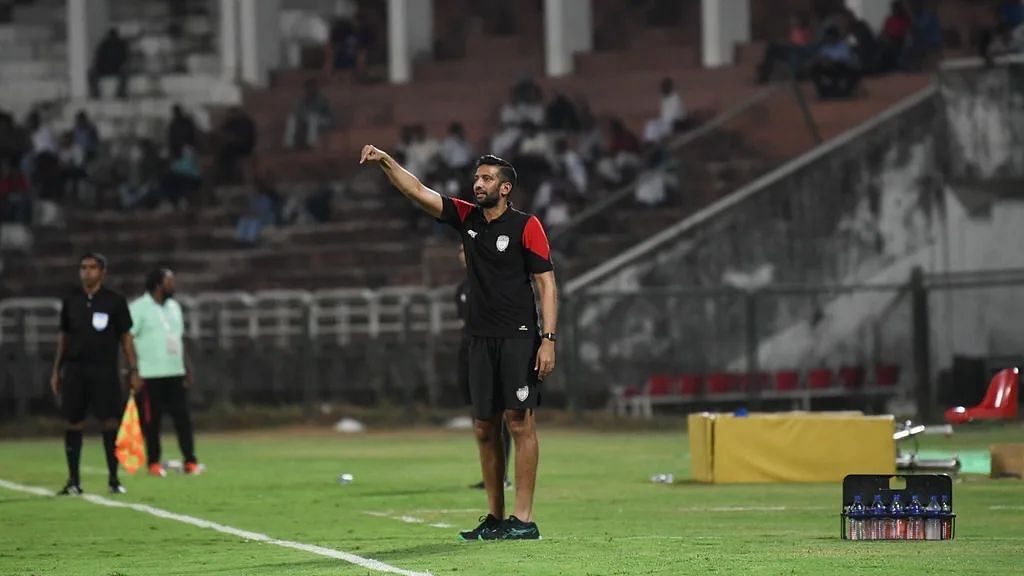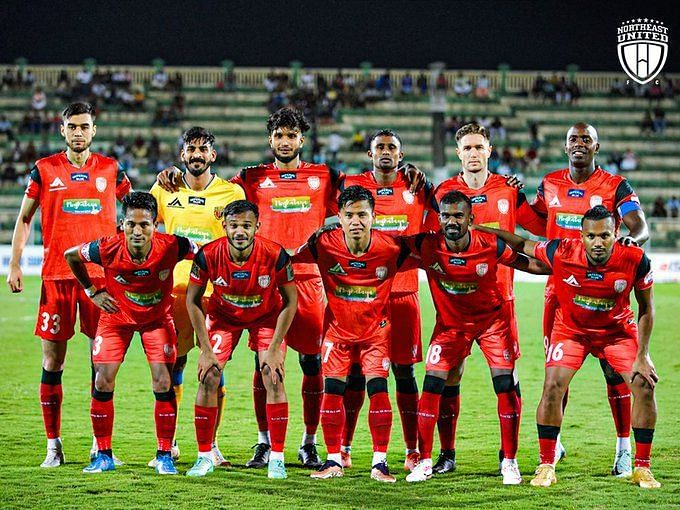
"I gathered the staff around and we set the standards" - NorthEast United FC's Floyd Pinto reflects on the remarkable turnaround in the Hero Super Cup
An underdog story in football is something that everyone craves. It certainly embodies the essence of perseverance, determination, and triumph against all odds. Napoli’s recent Serie A coronation was a sight to behold as it captivated the hearts of millions around the world.
In the context of Indian football, Odisha FC’s Hero Super Cup victory stood out in that regard. With a relatively inexperienced Indian coach at the helm, the Juggernauts defied the odds and achieved the coveted silverware.
While Clifford Miranda and his men rightfully grabbed headlines, NorthEast United FC's rise went under the radar. After a poor Indian Super League (ISL) season that included two managerial changes, an insufficient squad, and calamities at the back, assistant coach Floyd Pinto was given the reigns of a club that lacked confidence and direction.
Pinto, of course, has the experience of performing the role of a head coach. He has, in fact, managed the Indian youth teams and the Indian Arrows in the I-League as well. But despite the experience, he faced an uphill battle and a daunting task ahead of him - to take over a side that has smashed all the wrong records in the recently concluded season.
However, within a month, the 36-year-old Indian coach transformed the team’s fortunes. Following a defeat to Chennaiyin FC in the first game, the Highlanders showed their mettle to overcome ISL Shield holders Mumbai City FC and Churchill Brothers to book their place in the semi-finals of the Hero Super Cup.
Despite going down to eventual champions Odisha FC, NorthEast United FC will unquestionably be thrilled with the achievement. Pinto, in an exclusive interview with Sportskeeda, revealed the challenges that were present and how ‘setting standards’ helped his squad to compete in the competition.
As Pinto reminisced about his journey, he spoke about his stint at RoundGlass Punjab FC and how that experience helped him to navigate the high-pressure situation at NorthEast United.
Here are excerpts from Sportskeeda's interview with NorthEast United FC head coach Floyd Pinto:
Q: Over the last three years, you have worked with different foreign managers at two separate clubs. How did you find the experience, and in what aspects have you grown as a coach?
Pinto: The role of a head coach and assistant coach is vastly different. Until I joined RoundGlass Punjab FC, I was always a head coach. When you’re the head coach, you have to follow what you believe and try to find ways to win games. Fortunately, when I joined Punjab, I worked under two fantastic coaches (Curtis Fleming and Ashley Westwood).
The philosophy I followed while at the AIFF was similar to what they followed at RoundGlass Punjab as well. The biggest aspect of what I’ve learned is that you need to prepare well and in advance. They were also very meticulous with respect to how they planned the season.
With Curtis, it was really good to see watch how close he was with the players. Every decision he took had to be in person. On match days, he used to personally knock on the door and explain the decision of why they were not named on the bench.
It was an environment that kept the players motivated at every stage and was similar to Ashely's well. We see that fiery, aggressive character on the screen, but when Ashley is in training and off the field, he is all for the players and the team.
The ISL then was a whole new experience. This season was so up and down that you try to figure out what happened. It was smooth sailing until RoundGlass Punjab, but my first season in ISL was a big learning experience in a way where there was lots of adversity.
As a coach, it taught me how to keep calm, how manage the environment, get yourself organized, and get the best out of the players.
Q: You took the reins after NorthEast United had a poor season. The team would have been low on confidence. How did you handle the pressure and motivate the players to perform for the Super Cup?
Pinto: It was just a month’s training. I learned a lot from my previous experiences with Kenkre FC, AIFF, and RoundGlass Punjab FC. One thing I was sure of is what I wanted to do as a coach in terms of the preparations, how I wanted to train, how we wanted to approach games, and the standards we wanted to set as far as fitness and tactical levels were concerned.
But the more important thing with this group was the mental aspect. After the players went through such a topsy-turvy season, it’s easy to switch off. So I gathered the staff around and we set the standards. Right from the training session to the recovery session, we tried to control things that were under our control. Fortunately, the players responded. It was a clean slate for all the players.
What we got in the month was a squad that was mentally refreshed, which was the biggest positive reaction. They looked like they were ready to compete and, more importantly, the team spirit in the camp was at an all-time high.
Q: Following the game against Chennaiyin FC, you spoke about how the team can be better at both boxes. Is it something you worked on after the defeat, which led to the improvement?
Pinto: The Chennaiyin FC game was a byproduct of the team not playing competitive games for a while. Chennai also played a couple of friendlies, so that affects your mentality when you go into competitive matches. I felt that was lacking in the first game. But it’s the basics. If you need to score goals and restrict chances, you need to be good in both boxes.
It’s not an individual effort, it’s a collective effort. We have been working throughout the camp on how to defend and attack as a unit. Unfortunately, it did not come to fruition in the first game, although it was well-balanced when we got a goal back.
But it was good to see the team taking that as a positive experience. Because everybody bought into what we wanted to do in the Super Cup, the reaction was there against Mumbai City FC and that made us happy.
Q: Tactically speaking, the structure looked easy on the eye. You utilized the pace and power of Jordan, Jithin, and Nigam upfront. But what stood out was the shape out of possession. The team were able to sustain pressure against Mumbai City FC and Odisha FC, two teams who dominate the ball. If you could give more insights tactically on the shape and what you changed?
Pinto: I had a lot of ideas in my mind with respect to how I wanted to buildup, progress through the thirds, transitions, etc. But it was such a short period of preparation that we couldn’t expect too much out of the players.
All our training sessions were based on how we can defend and attack collectively as a group. Every training session was competitive, and intense when it needed to be.
Every team we faced were physically strong. If you can't compete with them on a physical level, you’ve already lost the game. So, part of the preparations were trying to get the fitness levels up.
One thing we were happy about was that we could sustain the intensity. Then it comes down to shape and tactical aspects where there was a minor change from the game against Chennaiyin FC and Mumbai City.
Chennai like to play vertically, while Mumbai City like to keep the ball. We raised the intensity in the first game, and when it came to Mumbai City, we found that we had extra time to defend. But the shape was very simple. We tried to stay together and be compact because our game plan was to defend with respect to where the ball was and not where the man was.
The shape also helped us in counter-attacking situations. When we won the ball, we had players around to pass and move. You have a set of players and it’s also important to understand what their strengths and limitations were. We tried to put that into perspective and the game was simple. We tried to cut out goals from counter-attacks and set pieces.
Q: Where do you think NorthEast United FC can improve on in the upcoming season?
Pinto: There are a lot of things we can improve on. In terms of distances, in terms of pressing, with respect to how you progress when you receive the ball, with respect to defending in the boxes as well.
Against Odisha FC we were all over the place in the last twenty minutes. So, a lot of things can be worked upon. But the tournament was a good example for us to show in the upcoming season in terms of what we did, where we can improve, and take a step further in our development.

